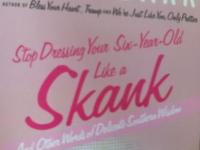BOB GARFIELD: On the Internet, anonymous free speech usually rules the day. It’s easy to hurl hateful insults at one another without ever having to use real names or stand behind an accusation. But, as we've reported on this show, some argue that we should be held responsible for the vitriol we spew online. These were some of the issues at stake in the much publicized case of Liskula Cohen and Rosemary Port. Cohen said she was defamed by an anonymous blogger who called her, quote, “the number one skanky superstar” on a blog titled, of course, Skanks in NYC. Cohen said she wanted to sue for defamation and needed to know the blogger’s identity. A New York court agreed, and so Google’s blogger service was obliged to reveal the blogger’s name. And she turned out to be Rosemary Port, an acquaintance of Cohen’s. Now, Port says she'll sue Google for failing to protect her identity. The whole case sounds a bit absurd, until you consider that state by state courts are wading through questions like these, about what does constitute defamation online and what relief should be granted the defamed. And this case has set a precedent in New York. As the Electronic Frontier Foundation’s Matt Zimmerman explains, it all came down to whether the word “skank” had a specific meaning.
MATT ZIMMERMAN: The New York courts found that the term “skank” actually was a precisely defined term and, therefore, could be held to be actionable.
BOB GARFIELD: Now, it may be if you’re a listener running for your dictionary you will not locate the word “skank” but the court was able to ascertain, to its satisfaction, that it was a specific charge of sexual licentiousness and maybe poor hygiene.
MATT ZIMMERMAN: Mm-hmm [AFFIRMATIVE].
BOB GARFIELD: Has that become now a term of art in defamation law?
MATT ZIMMERMAN: It remains to be seen, and it’s interesting now because, believe or not, there are now multiple courts who have ruled on the term “skank” about whether it’s actually capable of a defamatory meaning or not. In 2002, the California Court of Appeals ruled that the term “skank” doesn't have a definable meaning. As the court said, the word “skank” is a derogatory slang term of recent vintage; it has no generally recognized meaning. The New York court has come to a difference of opinion, so now we have an open question about whether the term can actually be held to be defamatory or not.
BOB GARFIELD: Now, the Electric Frontier Foundation, for whom you work, is kind of a First Amendment absolutist organization. Are there any circumstances where the Electric Frontier Foundation believes that Google or any other online entity should be forced to reveal the identity of an anonymous blogger?
MATT ZIMMERMAN: I wouldn't describe our First Amendment positions as absolutist at all. If someone is alleged to have made statements that can legitimately be interpreted as defamation, there are certain procedures in place that will allow litigants to obtain identity information. In Ms. Cohen’s case, once she got the identity of this person she dismissed the claim, decided to not go forward with it. If average users on the Internet think that they can use the court system to just figure out who is being mean to them, I think you really open the door for abusing the court system.
BOB GARFIELD: Now, the people at Google Blogger were at pains to release the name of the anonymous blogger under court subpoena. That blogger, Rosemary Port, now says that she will sue Google for obeying a court order. Is there any chance that a court will entertain that kind of litigation?
MATT ZIMMERMAN: I would be very surprised if such an action actually went anywhere. Everyone is obligated to respond to a court order, and Google actually says that in their terms of service.
BOB GARFIELD: So you know the George Carlin routine about the seven words that you can't say on the air?
MATT ZIMMERMAN: Mm-hmm [AFFIRMATIVE].
BOB GARFIELD: Maybe in the New York courts we need a new list of threshold words for triggering successful subpoenas on defamation cases. We now know the line [LAUGHS] is drawn at least below “skank” and “ho” but how far down do you suppose it will go? “Nudnik?”
MATT ZIMMERMAN: [LAUGHS]
BOB GARFIELD: “Goofball,” “creep?”
MATT ZIMMERMAN: I think it’s important to keep in mind the context in which a lot of these statements are made. If someone called someone a criminal that could, in theory, be the basis for a defamation claim. But it isn't even so simple as identifying particular words, it really is going to be a case-by-case situation. And that makes it pretty tricky for someone to be able to evaluate ahead of time whether or not a court is going to force someone to have their identity disclosed.
BOB GARFIELD: If the courts lower the threshold of what constitutes actionable speech, we're going to need a whole lot of courts, are we not?
MATT ZIMMERMAN: I look at this slightly differently. Even though I disagree with the court, I don't think that they're really changing the rules. What’s happening is that there is so much more speech now, public speech, because of the Internet, that it’s much more likely that the ordinary speech that everyone always participated in, in the past, is going to draw the attention of targets of that speech.
BOB GARFIELD: All right Matt, thank you very much.
MATT ZIMMERMAN: Hey, my pleasure. Thank you.
BOB GARFIELD: Matt Zimmerman is a lawyer for the Electric Frontier Foundation.
